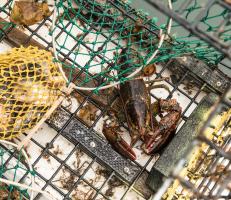
Photo: Greta Rybus for The New York Times
We recently posted about concerns that the current Maine lobster boom may collapse in time due to climate change. The fishing industries in Maine and Alaska are facing a far more immediate challenge, however. New US tariffs on steel and aluminum and retaliatory tariffs on lobster imports by China could drive up costs and cut lobster exports while giving Canadian lobstermen an advantage. Likewise, retaliatory tariffs on salmon and other Alaskan seafood could seriously hurt their fishing industry.
As of July 6th, China will impose an additional 25% tariff on Maine lobster. China buys about a fifth of American lobster exports, valued at $137 million. The tariff is expected to give Canadian lobster exporters, who are not subject to the tariff, an advantage in the Chinese market.
The US steel tariffs are also driving up the cost of lobstering. Modern lobster pots are made of steel mesh. The US tariffs are making lobster pots more expensive, whether they’re made with American steel or foreign products.
Of course, the lobster industry is not alone. The tariffs are intended to protect the roughly 300,000 workers in the steel and aluminum industries. Unfortunately, the tariffs are likely to hurt the 17 million US workers in industries which use steel and aluminum. The tariffs are also resulting in retaliatory tariffs by our trading partners. The lobster industry is getting hit from both directions.
The Alaskan fishery will also be hit hard by new Chinese tariffs. Alaska Public Media quotes Garett Evridge, an economist with the McDowell Group, who specializes in the seafood industry, who says, “In 2017, Alaska exported about 1.1 million metric tons of seafood to countries around the globe. Of this total, China accounted for a little bit less than half of that. In terms of salmon, exports of Alaska salmon to China account for about 40 percent of our total salmon exports. And over the last five years or so, about one in three salmon that has been exported from Alaska has gone to China.”
The current trade war is also expected to result in losses to American farmers. Job losses are also expected in aircraft, machinery, the automotive industries.

Guess this means lobster prices will be coming down. Good for the tourists, bad for the commercial boats that have a high overhead.
There are no winners in war etc. – including trade wars.